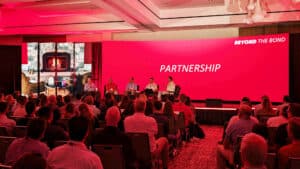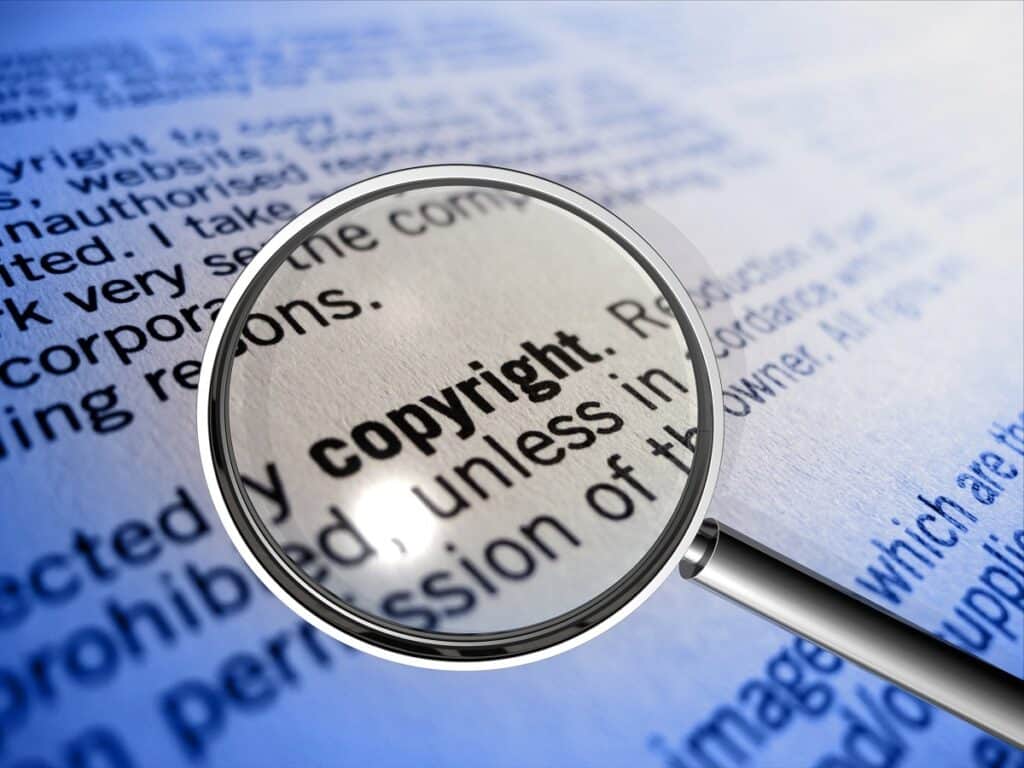When you’re planning an event, you may want to consider using music to entertain your attendees. Whether it’s a virtual, hybrid or in-person event, you will more than likely need a music license. The last thing you want is to overlook your music licensing rights and pay for it after the fact whether that be your virtual event stream or recording being taken offline, a legal battle, or a fine.
This guide to music licensing for events breaks down all the essential information you need to determine and acquire the right music license you need for your event. And, we’ll even point you in the right direction towards free alternative solutions.
What is a music license?
Very simply, a music license is an agreement between you and the organization that manages the rights of a song. Often, this agreement specifies the types of permission(s) you have to play a song, or songs, in a particular setting.
For example, every time you buy a CD or stream a song via Spotify, you are entering into a music license that allows you to play that song in a private setting. If you were to play a song for a group of friends, family members, or a combination of the two, the normal rights associated with buying or streaming a song have you covered.
However, if you were to make that group a little bit larger, and if you were to charge money to come to said event, all of a sudden, the normal permission (i.e., license) that comes from buying or streaming that song no longer applies.
Private vs. Public Use
The same is true with your event. An event does not fall into the category of normal song use; therefore, specific types of music licenses must be acquired. Sometimes multiple licenses must be acquired from multiple sources to prevent any unwanted lawsuits or fines. The same license that would allow you to play music over a loudspeaker at an event is much different than the license you would need to put that same song in a promotional video.
Why do you need a music license?
Music licenses not only protect the intellectual property of musicians and songwriters, but they also help protect venues, organizations, and people against lawsuits. A valid music license sets up terms and conditions wherein a song can be played in certain circumstances.
For example, a public performance music license allows you to play a song for over 1,000 people. In contrast, sync licensing allows you to put that copyrighted music behind video, pictures, promotional materials, etc. We’ll get into the differences of some of these licenses a bit later, but for now, just know that different licenses have different duties.
Music needs to be paid for, and PROs help to protect the intellectual property of the artists they represent. While you will probably never find yourself in a legal battle with one of these PROs, we should warn you that playing music at your event without the proper license could cost you a pretty penny in fines and fees.
The fees that PROs can charge for certain types of music licenses are minimal compared to the fines and legal fees you could face if you are caught operating without one. Not having the proper music license is not only the wrong choice; it’s a costly legal decision that could come back to bite you.
What is a PRO?
PRO stands for Performing Rights Organization, and there are four major PROs in the United States. The four major PROs are ASCAP, SEASAC, GMR, and BMI. Every songwriter and producer that creates original music belongs to a PRO. Think of a PRO as a musical protection agency that enforces the proper use of the intellectual property and ensures musical artists are being paid properly.
Because each artist can choose which PRO to belong to, you will have to do a little bit of research about which PRO to go through when attempting to obtain a music license. Since there may be multiple songs you are interested in using at your event, don’t be surprised if you find yourself having to deal with all four major PROs!
This occurrence is exactly why all PROs strongly recommend that any organization, group, etc., that plays music at company events purchase a blanket Public Performance license from each major PRO. This blanket license permits you to play any song from a PROs catalog in most public settings, including events.
Types of licenses
We have already hinted at a few of the major types of music licenses but let’s take a closer look:
Public Performance: This type of license is for any piece of music that’s performed publicly. Before you get ahead of yourself, yes, playing a recording of a song is still a public performance.
A public performance license is one of the easiest to obtain as this license is procured through a PRO. Whether you want to license one or two songs as intro music for your guest of honor, or whether you want your DJ to be able to play the request of any guest, a public performance license is a great all-purpose music license for events.
Synchronization & Master: As alluded to earlier, these licenses are used for music synced to video. Even promotional videos that employees see technically require a synchronization license.
In music, Master refers to the final version of the musical work and multiple parties typically share the rights to the Master. To procure a Sync/Master license, you will need to track down every party associated with the song and get them to agree to the terms. Needless to say, this is not an easy feat.
Companies will often use boutique production music companies like Jingle Punks or Marmoset to compose music rather than shelling out for a sync license. You will still pay a licensing fee with a production music company, but it will be far less than paying for a top 40 hit.
Mechanical: This final type of music license is strictly to do with music distribution. Likely, you will have no use for a mechanical rights license. Without the proper mechanical license, though, you are not allowed to hand out personalized mixes to the guests of your event!
We at Vario can safely assume public performance licensing is probably the music license category best suited for your needs if you’re simply looking to play walk up music for speeches and background music during breaks and meals. Public performance licenses are unique to each PRO. Still, all four have some version of a “music for business” license that covers music for corporate events, music in the workplace, hold music for conference calls, etc. To procure a music for business license for your next event or to research a public performance license for a single song, the four major PROs are ASCAP, BMI, SEASAC, and GMR.
Who is responsible for a license?
You are the sole party responsible for procuring the correct music license for your event. It should be noted that some venues have their public use music licenses, so check with your venue before you purchase a license. You can also check in with your hired DJ or live band to see if they have coverage already. That being said, it never hurts to be double covered just in case you get bad intel from someone.
How much is it to obtain a license?
Music licensing companies often charge a flat fee based on the type of usage, and all of the major PROs have their categories and rates, especially as they apply to corporate events. However, based on the number of people you expect at your event, the flat rates for even the most basic public use license increase.
ASCAP is the most friendly of the PROs when it comes to public performance licenses as their “Music in Business” license only runs a couple of hundred dollars. The prices are similar for SEASAC, BMI, and GMR, with blanket licenses for businesses and events costing $400 or less.
While the initial cost of a blanket license is low, these PROs do follow up at year’s end to determine if you had any events with more people than the license was intended for. Remember that honesty is the best policy, and paying a little extra at the end of the year is a lot better than being served legal papers.
Are there any exceptions?
Royalty-free is the only loop-hole to the music licensing dilemma; it simplifies the process by removing the need to negotiate licensing fees with the Performance Rights Organizations (PRO’s). It is important to understand the term royalty-free does not automatically mean free music– a common misconception. Royalty-free allows the buyer to choose a piece of music and use it as many times as they want. It is free from having to pay royalties on each recurring use. There is, however, free royalty-free music and paid royalty-free music available:
Free Royalty-free music: This type of music is up for grabs, free of charge to the traditional buyer, with conditions or rules. There are two categories of licenses that a song falls under, including:
- Public Domain Music: This music can be used without paying the author and without their permission. A song can fall into the public domain category for a few reasons, such as the author not ever having copyright, they put the song in the public domain, their rights expired, or they released them into the public domain
- Music provided by free licenses: Usually, when the author is not making a profit off of the music, the license will fall under this category. This music differs from public domain music because the author controls the limitations for the reproduction, distribution, diffusion and copy of his work. They may require you to attribute to the author in a few different ways.
Paid Royalty-free music: Why would someone choose to pay for royalty-free music? There are a few reasons, including the buyer doesn’t want to attribute the artist, they want to modify it, they are unable to attribute the author, and more.
To learn more about the specific classifications for both free royalty free-music and paid royalty-free music, visit this link.
Keep in mind, royalty-free music may not be of the highest quality. It’s sort of like the difference between a major motion picture and your dad’s home videos. They’re both technically movies, but one is very clearly a better product.
An Online Tip
Be aware that even if you purchase a license to play music, it does not automatically prevent Vimeo, an online video-sharing platform, from taking down your live stream or recorded event content. Vimeo does not have automated bots that scrub their videos for copyrighted material (like YouTube does). However, if someone viewing your video submits a DCMA complaint to Vimeo, Vimeo will be obligated to take down that content from publicly-facing areas until they review it with the profile owner. If the profile owner can prove to Vimeo that they own the correct licensing to play the material, they will allow it to be republished on publicly facing pages.
The correct music license will prevent the profile owner from being sued but does not prevent the live stream or recorded content from being taken down temporarily. For this reason, we encourage clients to really think through their decision to play, for example, a Top 40 playlist for all presenters’ walkup music.
Music At Your Next Event
If you made it to the end of this article, hopefully you feel adequately armed with plenty of information about music licenses, why they are important, and how to follow the rules. Remember, even virtual events require music licenses, so make sure to make room for them in your virtual event budget.
Of course, with your commitment to us as a production partner, we’re here to further advise you so you don’t skip a beat — literally and figuratively. If you have a vision, Vario is here to help. We are the production management company that will customize any event and make it memorable for all attendees. Be sure your next corporate event goes off without a hitch, and secure the music license you need! Contact us at Vario today.








